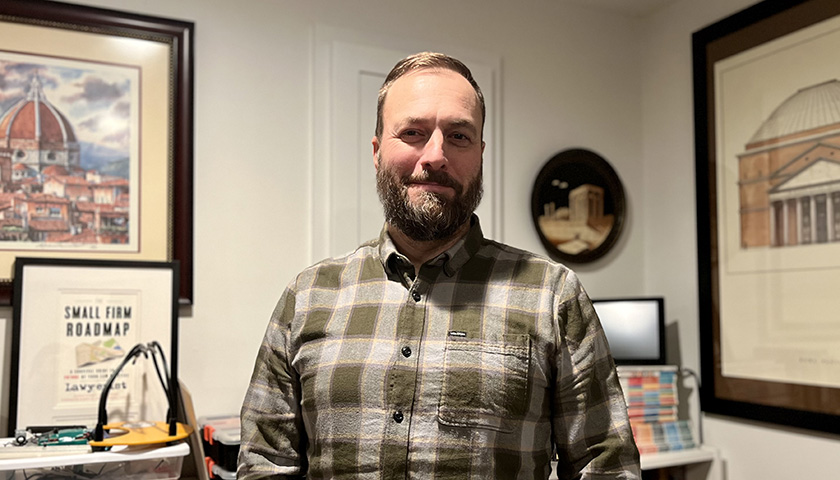Suffolk Law Welcomes Innovator Sam Glover
Suffolk Law's Sam Glover works with courts, organizations, and the LIT Lab team to build online tools that make legal processes more accessible.

Early in his legal career Sam Glover defended consumers from abusive debt collectors and landlords. He also founded Lawyerist, a legal resource hub for small and solo lawyers. He has been recognized as a legal innovator by the American Bar Association and Fastcase. Before joining the LIT Lab he opened a website design, strategy, and development studio. Glover describes himself as “a bookworm, aging skate punk, whittler, paddler, and—technically—lawyer.”
What sparked your interest in joining the LIT Lab?
I have been a fan of the LIT Lab since its inception. I appreciate the way it connects the dots between thinking like a designer, thinking like a developer, and thinking like a lawyer to solve legal problems. And I love how the LIT Lab puts some of its collective energy into big projects with the potential to transform the legal system like the Document Assembly Line.
What has been the biggest learning experience from your journey starting a law firm, to Lawyerist, to website design and development, to the LIT Lab?
I think the common thread in all those organizations and roles is the need to solve problems—for clients and for the organization. And the biggest learning experience was going from thinking I had all the answers to those problems to realizing I didn't actually understand the problems well enough. I've learned the key is to dig deeply into a problem until you really understand it. Once that happens, the solution often presents itself; but even if it doesn't you'll definitely be ready to start proposing better solutions.
You've seen a lot of tech come and go in the legal world. What's the coolest thing you've seen so far, and where do you think legal tech is headed?
I think the end of the tech adoption curve, when technology becomes "boring,” is usually the most transformative on society—and therefore the coolest. For example, we can talk about the profound ways in which cell phones have transformed society and culture, but that didn’t happen until they became ubiquitous.
So while AI has mountains of disruptive potential, it’s still early in the tech adoption curve. On the other hand, web forms, guided interviews, and document assembly, the kind of technology you find in the LIT Lab’s Document Assembly Line, is in the late stages of the tech adoption curve. That means it is getting boring enough that even courts are starting to adopt it. That’s why I think it is potentially the coolest thing I’ve seen so far.
I don't presume to know where legal tech is headed. For one thing, the tech adoption curve tends to be even more drawn out in the legal industry. This can be frustrating, but it isn’t all bad. But it seems pretty clear at this point that adding AI to things is the plan for the near future, including for legal tech. It just seems like an obvious way to supercharge so many things.
How do you think legal tech can really make a difference in social justice issues?
On its own, technology is just a particular approach to solving problems. Technology is at best neutral on social justice issues and at worst amplifies those issues. So when solving legal problems with technology, we have to make informed choices. Every solution involves tradeoffs and consequences, and selecting one solution over another is also selecting one set of tradeoffs and consequences over another. One solution might amplify social injustice, while another might have the opposite effect.
Understanding those tradeoffs and consequences requires questioning our assumptions and digging deep into the problems we are trying to solve. And this can't be a solo research project. Diverse perspectives lead us to better, in this case, more just, solutions.
What are you most excited about working on at Suffolk's Legal Innovation and Technology Lab?
If courts are the primary user interface of the legal system, let’s just say there is a lot of room for improvement. The LIT Lab is playing a key role in upgrading the legal user interface, and the result will be a quantum leap forward for everyone—lawyers and self-represented litigants. Earlier I called the technology “boring,” but what we can do with it is anything but boring. If we implement it widely and well it will be a huge leap forward for access to justice.
What's your top piece of advice for law students or young lawyers eager to dive into legal tech?
Just do it! The more you learn, the bigger toolbox you will have for solving legal problems. Lawyers who are skilled with technology are better equipped for law practice, whether that means working with clients or doing anything else in the legal profession.



